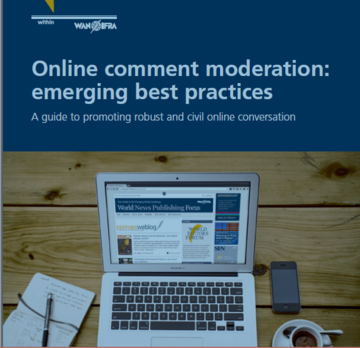
The study published by World Association of Newspapers (Wan-IFRA) is based on interviews conducted with staff of 104 news outlets in 63 countries, plus a selection of experts from the corporates and academic worlds to identify key trends, opportunities and best practices for online comments management. Online comments emerge as one crucial area of communication between media editors and readers. Very few media do not allow online comment at all. Inputs coming from readers’ comments are seen by almost half of the news outlets’ staff interviewed in the study as a valuable resource for better journalism and reader engagement, while the other half accept them as a ‘necessary evil’.
The management of online comments requires time, people and money resources. This is due to the fact that it is impossible to limit commenting to those who have something constructive to say. Discussions frequently descend into torrents of insults and hate speech, which is listed as one of the first reasons for deleting comments.
News outlets adopt different methods to moderate online comment, which they consider very important to be managed properly so as not to damage their brand identity. Another key consideration for news organisations in determining their moderation strategy is how legally liable they are considered for the comments made by users on their site.
Main Findings:
- News outlets are differentiated among those who moderate pre-post publishing (38 and 42 respectively) and those who adopt a mixed approach (16).
- They delete an average of 11% comments either because they have offensive content (hate speech, bad language) or they are spam.
- The majority of the interviewees think that they decide the kind of conversation they want to host on their platform and this does not limit the freedom of expression of their readers.
- The legal situation surrounding online commenting is ‘a grey area’ for most of the interviewees, as they don’t seem to know precisely what is considered illegal comment.
- Although anonymity seems to give protection to those adopting offensive/hate speech online, many media companies do not request real name registration because they think readers should have the possibility to speak freely.
- Readers’ comments on their social networks are less heavily moderated because they are not considered as ‘their territory’ and because the real identity policies are seen to make the discussion less controversial.
- Many among the interviewees think that when the journalist is involved in the conversation with the readers the level of comments tend to improve. Some think that their involvement in the debate is not appropriate, while others believe that it should not become a frequent practice.
- Among other practices adopted by news outlets: the selection of the best comment or the most active commenter; surfacing quality comments; highding offensive comments rather than deleting them; using filters like ‘Bozo’ to make visible offensive comments only by its author but not by others; using softwares; giving voice to “minorities” (i.e. giving visibility to conservative readers’ comment in a liberal news outlet); encouraging the authors of offensive comments to rewrite/reword their comment; give feedback to educate readers.

